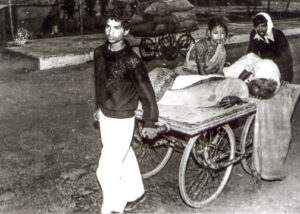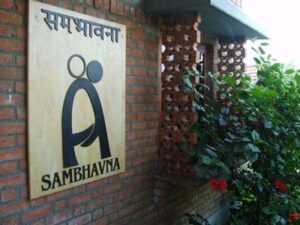Today we are deeply saddened to report that it has happened once again. In the early hours of this morning, tragedy struck for communities on the outskirts of the south Indian city of Visakhapatnam, Andhra Pradesh, when deadly styrene gas leaked from a nearby plastics plant owned by Korean company LG Chem. Initial reports suggest the gas spread to five nearby villages, killing at least eleven people, including children, and hospitalising hundreds more.
Footage on the ground shows scenes terrifyingly similar to those that occurred on that fateful night in Bhopal in 1984: people and animals dead, dying and unconscious in the streets, lying where they fell in a desperate effort to outrun the clouds of toxic gas. The sight of an overturned motorbike lying in the mud, its rider next to it, suggests the gas was so fast-acting even they were unable to stay ahead of it. The fear is that many more are still lying in their beds, caught by the gas in the depths of a sleep from which they will never wake.

For the survivors of the Bhopal gas disaster, this tragic event revives deeply painful memories. Today, 35 years on, they are still suffering the effects from their own night of horror, as well from chemicals dumped in and around the factory that were left to seep into the earth, contaminating the soil and groundwater. Determined that they will not see another community destroyed by corporate negligence, the survivor groups in Bhopal are already mobilising to offer their support to the people of Visakhapatnam and issue demands to the Andhra Pradesh state government and LG Chem to ensure a proper clean-up of the site and compensation for victims.
In an interview with The Quint this morning, Sathyu Sarangi of the Bhopal Group for Information and Action and Managing Trustee of the Sambhavna Clinic, expressed concerns about the toxic nature of styrene gas. He explained that it is known to cross placental barriers and damage the foetus, possibly leading to miscarriages and birth defects, problems that have affected three generations in Bhopal since the gas disaster. He also cited the Shriram Oleum gas leak case, another gas disaster that occurred in Delhi shortly after Bhopal, as having set legal precedent for corporate liability in such cases:
“The concept of absolute liability was invoked in the Shriram Oleum case. It states that if a corporation stores a chemical that is inherently unsafe then the liability would be absolute, which means you cannot make excuses [such as that] it was neglect.”
The factory in Visakhapatnam is registered to LG Polymers, owned by Korean company LG Chem. It produces plastics and polystyrene for the manufacture of disposable plastic cutlery, foam plates and cups. As in the Union Carbide pesticide factory in Bhopal, the cause of the leak appears to have been a chemical reaction in one of the tanks, resulting in three tons of styrene gas escaping into the air. According to local police, the gas “was left there because of the lockdown. It led to a chemical reaction and heat was produced inside the tanks, and the gas leaked because of that.” If true, the fact the chemicals were left there during a period of reduced staffing due to the lockdown suggests safety standards may have been breached.

Styrene has been identified as a human carcinogen that is ‘a suspected toxin to the gastrointestinal tract, kidneys, and respiratory system, among others’. In the body it metabolises into styrene oxide, which is believed to be mutagenic and neurotoxic. A majority of those exposed appear to have died or fallen unconscious due to suffocation, with the gas primarily affecting the lungs and respiratory system, but the long-term effects of exposure are currently unknown. Sadly, the people of Visakhapatnam have the added complication that this crisis has occurred within the wider global crisis of Covid-19. Public health infrastructure is already stretched, both locally and around the world. Lessons must be learned from this fresh disaster, and quickly, in order to prevent any further disasters during this difficult time. There is an urgent need to ensure that such risks are not taken in other industrial plants as a result of COVID-19 related changes, both elsewhere in India and abroad. Advance planning, risk assessments, safety measures and contingencies must be developed.
It is unclear what the long-term effects of the leak are likely to be for local communities, with some outlets reporting the gas has already spread to a further 15 villages. As in Bhopal, the toxic nature of styrene gas means the long-term effects could be catastrophic for both local people and the environment. In the wake of the leak, the state government has announced that they will be airlifting in 500 tons of a special chemical known as PTBC, produced in Gujarat, to neutralise the gas. They have also offered compensation of RS. 1 crore (roughly £100,000) to the families of those that died, as well as varying amounts to those in critical condition or in need of hospitalisation due to exposure.
Details are still emerging but the parallels to Bhopal appear to extend to the multinational corporate ownership of the factory from which the gas leaked. It is our hope that the parallels end here, and that evasion of liability therefore does not, as with Union Carbide in Bhopal, form the crux of the parent company’s response. A thorough investigation must be held to determine how this disaster was allowed to happen. The fact that such disasters are still occurring 35 years after Bhopal highlights the urgent need for corporate responsibility. Continued industrialisation in developing countries without improvement in safety regulations can, and will continue to have, catastrophic consequences. Industrial disasters are tied to global markets. The Bhopal disaster was caused by companies seeking to exploit India’s pesticide market, while this leak was from a company producing polystyrene. We know from Bhopal and others that gas disasters have a long impact – on health, on the environment, on livelihoods. Both the industry and government now have a responsibility to support the affected communities and tackle the immediate and long-term impacts of this fresh disaster. Our Managing Trustee, Tim Edwards, has issued a statement:
“Tragically, all the signs are that the horrific events in Visakhapatnam today are likely to signal the beginning of another enduring industrial disaster in India. Unlike in Bhopal, the welfare of surviving victims and the families of those who perished must be the primary focus of all responding agencies. Parent company LG Chem must immediately step forward and assume full responsibility for medical care, long-term health monitoring, environmental restoration and compensation, and fully cooperate with all subsequent criminal enquiries.”

A model for community-led primary healthcare and rehabilitation following gas exposure has already been created by the survivor organisations in Bhopal. We hope that a similar model can be adopted by authorities in Visakhapatnam and that the lessons learned from the Bhopal Gas Tragedy are properly utilised. These lessons came at great cost to the communities of Bhopal. They have paid and continue to pay with their lives and their livelihoods. They have been abandoned by governments and abused by Union Carbide. Forgetting these lessons would not only be a failure of governance and leadership, but also a moral failure. And it will lead to the current tragedy becoming another scandal, one that the communities now in grief, pain and distress cannot afford.


